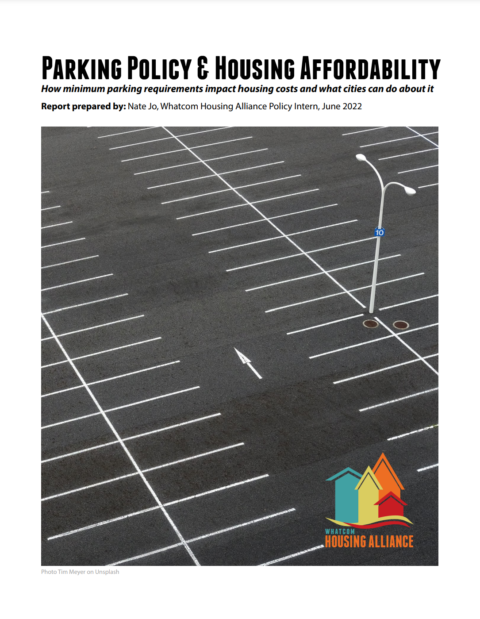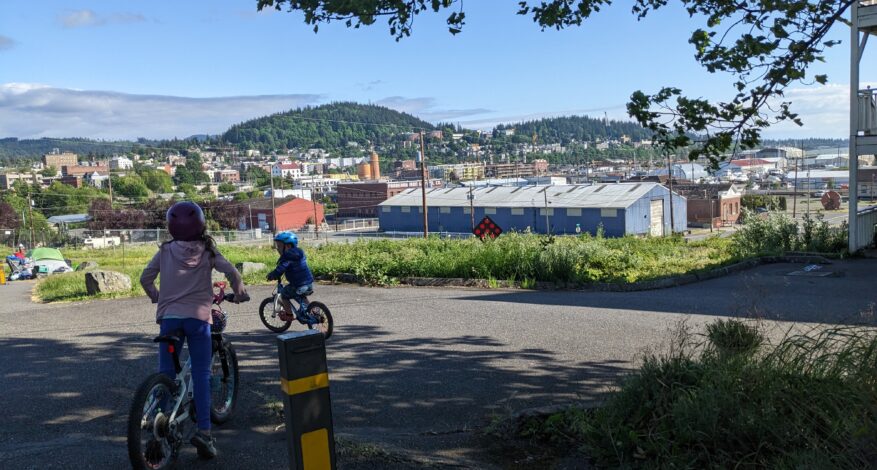Bellingham Embraces Progress: Parking Minimums Removed to Foster Housing Solutions
On January 13, Bellingham City Council voted to pass an interim ordinance to eliminate parking minimums for new residential developments. This bold move aligns with the city’s commitment to addressing housing affordability, reducing environmental impacts, and creating a more walkable, accessible urban landscape. Backed by Mayor Kim Lund and her Executive Order, and informed by robust community dialogue, this interim ordinance sets the stage for a year-long evaluation of its impacts—and we at Whatcom Housing Alliance (WHA) couldn’t be more excited to celebrate this milestone.
A Brief Timeline of the Journey to Reform
 The discussion around parking minimums has been a topic of consideration for several years within the Bellingham City Council. In June 2022, the Whatcom Housing Alliance released the Parking & Housing Affordability white paper (learn more about our research and resources here.)
The discussion around parking minimums has been a topic of consideration for several years within the Bellingham City Council. In June 2022, the Whatcom Housing Alliance released the Parking & Housing Affordability white paper (learn more about our research and resources here.)
In February 2024, the Council unanimously directed city planning staff to explore options for parking reform, including the potential elimination of parking minimums citywide or in specific areas such as urban villages and transit corridors. By May 2024, city staff presented these options during a work session, highlighting the potential benefits of such reforms on housing affordability and environmental sustainability.
The Council’s interest in these reforms was further emphasized in November 2024 when Mayor Kim Lund issued an executive order directing immediate actions to increase housing opportunities, including the removal of parking minimums citywide. On December 16, 2024, the City Council voted in favor of an interim ordinance to eliminate parking minimums, setting the stage for a public hearing and final vote on January 13, 2025.
Bellingham has previously acknowledged the housing crisis in multiple instances. In July 2023, the City Council declared a housing crisis, citing the significant number of renters burdened by housing costs. Further back, in 2017, the Council began acknowledging housing affordability as a critical issue and hosted a town hall meeting on housing affordability and homelessness. These declarations highlight the ongoing challenges the city has faced in providing affordable housing and the continuous efforts to address them. But in none of these instances was parking successfully reformed or targeted.
Why Parking Minimums Matter
Parking minimums have historically required developers to build a specified number of parking spaces with every new housing unit, a practice that has led to inefficient land use, prioritizing cars over homes. By saving valuable land for housing rather than parking lots, Bellingham is choosing to put people and community needs first. Removing parking mandates doesn’t mean developments won’t have parking; rather, it empowers developers to assess and provide parking based on actual demand. This flexibility is especially impactful in areas well-served by public transit or with walkable amenities, where parking demand is lower.
A Step Toward Housing Affordability and Sustainability
Mayor Lund eloquently captured the essence of this change, stating,
“This is one of many tools that we can use to address our housing crisis while supporting climate resilience goals. It is also an opportunity to evaluate how we can better support walkable neighborhoods and transit systems in our community.”
By reducing regulatory barriers, Bellingham is paving the way for housing projects that better meet the needs of our community. Eliminating parking minimums is a step toward ensuring that housing can be built more affordably and efficiently, addressing the supply shortage that has contributed to rising rents and home prices. This policy benefits both market-rate and affordable housing projects, providing the flexibility needed to deliver housing options for a wider range of residents.
One shining example of the positive impact of innovative housing policies is the Astor project in Old Town. This development has significantly increased housing availability in a key area, demonstrating the potential for thoughtful planning and community-focused solutions to make a tangible difference.
The Astor project in Bellingham’s Old Town neighborhood is a six-story building located at 707 Astor Street. It includes 84 residential units, comprising a mix of studio, one-bedroom, and two-bedroom apartments, along with 1,600 square feet of commercial space on the ground floor. The development provides 36 parking stalls—20 situated under the building and 16 in a surface lot. Removing parking minimums in Old Town at least doubled the number of homes that will be built.
Supporting Smart Growth and Community Resilience
This policy shift reflects the forward-thinking leadership of our city council and the unwavering commitment of local advocates and residents who have called for solutions to Bellingham’s housing challenges. With a growing population and a pressing need for equitable housing options, removing parking minimums signals a move toward smart growth.
Bellingham is joining other forward-thinking cities across the U.S., such as Minneapolis, Portland, and Austin, in adopting evidence-based approaches to housing policy. These cities have demonstrated that removing parking mandates can lead to increased housing affordability, better land use, and more vibrant communities.
The ordinance also supports Bellingham’s Climate Action Plan goals by encouraging reduced car dependency and increased investment in alternative transportation. As the city continues to explore enhancements to its transit network and pedestrian infrastructure, this policy fosters neighborhoods where people can live, work, and thrive without relying on personal vehicles.
A “Yes, and…” Approach to Housing Affordability
The removal of parking minimums exemplifies a “Yes, and…” approach to tackling housing affordability. Tying parking reform to affordability as a standalone solution is an “either-or” approach, but advocating for both—removing parking minimums while simultaneously implementing strategies to increase affordable housing through state and federal programs—creates a dynamic “Yes, and…” framework. This strategy not only addresses supply issues by increasing the number and variety of homes but also helps stabilize housing costs, benefiting the entire community.
This nuanced approach reflects the research and recommendations of Bellingham city staff, who concluded that parking reform is an essential step to tackle the housing crisis effectively. While no single strategy can solve the complex challenges of housing affordability, combining parking reforms with investments in multimodal transportation and affordability measures ensures that solutions are inclusive and impactful. Removing parking minimums enables developers to build housing that meets the diverse needs of residents while promoting sustainable, community-focused growth.
What’s Next?
This interim ordinance provides a year-long testing period, during which the city will closely monitor its effects on housing development, affordability, and transportation patterns. The insights gained will inform future decisions, ensuring that the policy continues to serve the best interests of our community.
At WHA, we’re committed to supporting initiatives like this that prioritize housing access, environmental stewardship, and community vitality. We applaud Mayor Lund and the city council for their leadership and vision and look forward to collaborating with partners across sectors to maximize the positive outcomes of this policy.
Join Us in Celebrating
The removal of parking minimums is a win for Bellingham—a step toward a more affordable, sustainable, and inclusive future. Let’s celebrate this progress and continue to advocate for policies that put housing and community well-being at the forefront.
Together, we’re shaping a city that works for everyone. Full Public Comment Period, staff and council deliberations is below.

